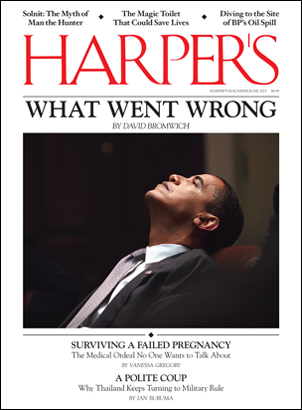Introducing the June Issue
David Bromwich reflects on Barack Obama’s presidency, Antonia Juhasz follows the trail of BP’s oil in the Gulf of Mexico, Ian Buruma asks why Thailand keeps turning to military rule, and more
 “Anyone who voted twice for Obama and was baffled twice by what followed—there must be millions of us—will feel that this president deserves a kind of criticism he has seldom received,” David Bromwich writes in this month’s cover story, “What Went Wrong.” I trust I am not revealing too much about my own political leanings when I say that Bromwich delivers on the promise of his bluntly titled essay. His analysis of President Barack Obama’s personal failings and public failures—his “peculiar avoidance of the business of politics”; his inability to close the prison at Guantánamo Bay, a decision he characterized, perhaps too candidly, as “the path of least resistance”—is overdue and essential, whether you voted for the current president twice, once, or not at all.
“Anyone who voted twice for Obama and was baffled twice by what followed—there must be millions of us—will feel that this president deserves a kind of criticism he has seldom received,” David Bromwich writes in this month’s cover story, “What Went Wrong.” I trust I am not revealing too much about my own political leanings when I say that Bromwich delivers on the promise of his bluntly titled essay. His analysis of President Barack Obama’s personal failings and public failures—his “peculiar avoidance of the business of politics”; his inability to close the prison at Guantánamo Bay, a decision he characterized, perhaps too candidly, as “the path of least resistance”—is overdue and essential, whether you voted for the current president twice, once, or not at all.
Vanessa Gregory’s Memoir begins with an ultrasound that takes too long. The technician, unable to find a gestational sac in Gregory’s uterus, falls silent; she calls in Gregory’s doctor, who tells her that he fears the pregnancy might be ectopic—that is, one in which the fertilized egg implants outside the uterus and so must be terminated. “I lay on my back as he explained this,” she writes, “naked below the waist except for a stiff paper blanket, the probe from the transvaginal ultrasound machine still resting inside me.” Three days later, Gregory’s doctor calls to confirm the diagnosis. What follows is both a history of ectopic pregnancies—which, as late as 1883, were fatal in as many as 99 percent of cases—and a personal reckoning.
Antonia Juhasz travels 5,272 feet beneath the surface of the Gulf of Mexico to the site of the Deepwater Horizon oil rig explosion—which, in 2010, leaked over 100 million gallons of crude into the water. Aboard the research submarine Alvin, Juhasz follows a team of scientists as they gather animal, plant, water, and sediment samples from the seabed’s fragile ecosystem. Though BP, which operated the rig, claims that there has been “very limited impact from the oil spill on the seafloor,” the scientists worry that the opposite is true. The ecological effects could be devastating: “If you short-circuit the bottom,” Dr. Samantha Joye, a biogeochemist at the University of Georgia, tells Juhasz, “you threaten the entire cycle. Without a healthy ocean, we’ll all be dead.”
Ian Buruma lands in Bangkok with a series of questions on his mind. Primary among them: “Why does Thailand, which is in some ways the most open society in Southeast Asia, have such a hard time ridding itself of the scourge of military coups?” Thailand’s last coup was on May 22, 2014; in the past century, he writes, “there have been more than twenty coups or attempted coups.” And while they are generally bloodless, “the protests that follow are not.” This is the puzzling reality that Buruma investigates in the month’s Foreign Letter. And he uncovers a web of interconnected tensions between the country’s urban elite and its increasingly politicized rural poor that point toward an answer.
When one thinks of toilets—if one thinks of toilets at all—one thinks not of aesthetics but of functionality. Sallie Tisdale’s Annotation makes a compelling case for a toilet that not only works but also charms. After all, “Many people don’t know how to use a flush toilet—they’ve never had one, and they may not recognize the need for it.” Making a toilet attractive also makes it more appealing—and an appealing toilet could have a greater positive impact on global heath than Westerners might expect. As Tisdale notes, “90 percent of the developing world’s human waste flows into sources of freshwater, and this fecal contamination is the leading cause of the diarrheal diseases that kill hundreds of thousands of people each year, more than half of them under the age of five.”
Also in this issue: a new story by Adam Johnson; an investigation into the many (largely surveillance-based) uses of small, unarmed drones by William M. Arkin; David Thomson’s essay on lost films; Joshua Cohen’s take on literary feuds and friends; and a review of Unbreakable Kimmy Schmidt by Rivka Galchen.



